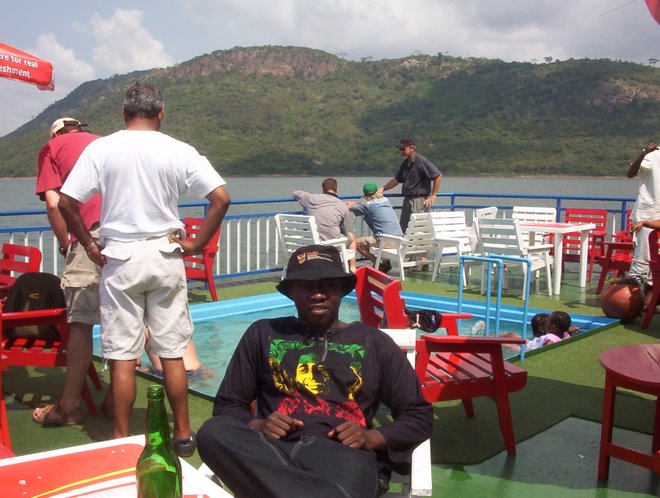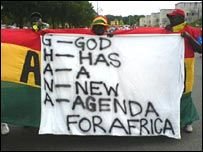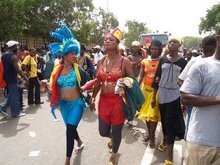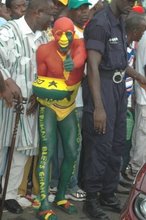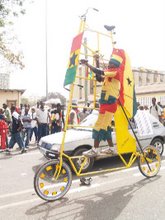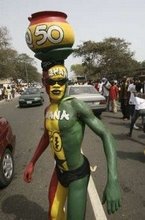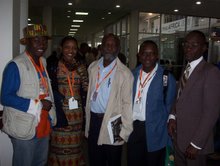KMA terminates contract with Freko
The Kumasi Metropolitan Assembly (KMA) has decided to discharge Freko FD Enterprise from the management of the Kejetia Bus Terminal in Kumasi.
This follows what the KMA terms as the expiration of terminal management agreement between it and Freko FD Enterprise.
Freko FD has been managing the bus terminal, deemed the biggest in the entire country since 2002.
A letter dated July 15, 2009 and signed by Mr Edward Afari Gyem, the Metropolitan Coordinating Director asked Freko to prepare and hand over the facility to the KMA latest by Wednesday July 22, 2009.
“Our records indicate that the Bus Terminal Management Agreement signed between the Kumasi Metropolitan Assembly and Freko FD Enterprise for the management of the Kejetia Bus Terminal was effected on 11th April 2002 for a duration of three (3) years and a renewal period of two (2) years”, the letter stated.
“We therefore wish to inform you that the agreement has expired and the Kumasi Metropolitan Assembly will be very grateful if you would as a matter of urgency, arrange to hand over the management of the Bus Terminal to the Assembly latest by the 22nd of July 2009. We wish to take the opportunity to thank you for your services rendered to the Assembly”, it said.
A new company is to take over the management of the lorry terminal but it is not clear, which company is to take over.
Freko won the bid to manage the terminal in 2002 after the World Bank, which financed the project had handed it over to the KMA during the tenure of Mr Maxwell Kofi Jumah as the Metropolitan Chief Executive.
The company has since maintained a harmonious relationship with the GPRTU whose vehicles dominate the terminal.
However in a response to the KMA’s letter, Freko FD stated that there were a lot of legal implications and transitional matters that out to be ironed out before a hand over.
They called on the KMA to reconsider the period of the notice in the light of the forgoing agreement arguing that, it required a reasonable notice to terminate the contract as per the general law of Ghana.
In a response letter through their solicitors, Dadson and Associates the company explained that the “continuing” term in the agreement was defined as the period immediately following the expiration of the agreement when the agreement has not been expressly renewed or terminated.
It explained that the agreement shall therefore be deemed to continue in force under the existing terms and conditions and even if the KMA decides in its sole discretion to terminate the agreement, it ought to have given Freko a six (6) calendar months notice.
They explained that in the circumstance of the KMA’s notice, it was instructive to note that even where they were to breach the agreement (which was not the case) the self-same agreement stipulates a notice period of at least three (3) months to terminate the agreement.
It also stated that it ought to be noted that the agreement expressly frowns upon unilateral amendment of the terms and therefore expressed the hope that the intention of the KMA was not to unilaterally vary or modify the agreement.
“Accordingly, you are respectfully called upon to reconsider the period of the notice in the light of the forgoing and revert”, it said.
It said in accordance of the Labour Act of Ghana, it was equally duty-bound in law to statutorily notify its employees of the termination of their employment and that was one of the several complications that attend the duration of the notice.
On the history of the agreement, Freko stated that the KMA has set up an oversight committee which was to review the contract and evaluate its performance with the baseline data to assist the Assembly in deciding the way forward of the management of the terminal.
It said a performance appraisal was commissioned and the report was ready for submission to the Assembly for deliberation.
It said from the forgoing, it appeared that an attempt was being made to shelve the report from the Assembly that commissioned it.
“In doing so, the Assembly is thereby denied the opportunity to evaluate the report. Such a unilateral decision by a public officer offends not only the constitutional requirement that the use of discretion by a public officer be not arbitrary, capricious or biased either by resentment, prejudice or personal dislike and shall be in accordance with due process of law”.
“In the light of the foregoing and many more concerns as to the other infractions of the law occasioned or threatened by your letter, we hope that your letter will be reviewed and a meeting arranged between us with a view to ironing out these legal and transitional matters and concerns to the best interest of the metropolis and the parties involved.
It would be recalled that in giving out the management of the lorry terminal to a private company, Mr. Maxwell Kofi Jumah, the then Metropolitan Chief Executive explained that the management of the lorry terminal was going to be on contract basis and gave a long list of what was to be expected at Kejetia.
This included the registering of special potters at the place and clothing them for easy identification, a thorough cleaning and monitoring of the infrastructure at the place as well as routine maintenance of the infrastructure.
Aside the deteriorating nature of the place currently is the present crop of vehicular congestion at the place.
The government decided to rehabilitate the lorry terminal in the late 90s with the intention to find a lasting solution to the problem of the heavy pedestrian population, which competed with vehicular traffic resulting in the confusion in the area as a result of the heavy “go-slow” that engulfed the area then and sprang to the centre of Kumasi.
The idea was to find a solution to the problem once and for all whilst at the same time maintain the natural beauty of the area, thereby separate the market, and the cars from the pedestrian.
It looks as if the problem that existed at the place earlier has been allowed to repeat itself with the construction of more market stores at the place thus limiting parking and loading points for vehicles.
There is congestion all over the place at Kejetia presently as vehicles struggle to get access to the terminal, which temporarily block traffic to Adum, Ashanti New Town and Manhyia creating confusion at the place.
The managers were to ensure that hawking was not entertained at the place but the direct opposite of what was outlined is being experienced at the place currently.





